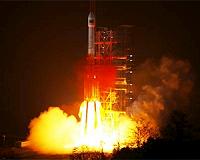 |
Beijing, China (XNA) Jun 08, 2010 The launch of the country's fourth Beidou orbiter late on Wednesday night signals "a step closer" toward the highly anticipated Chinese-version of the Global Positioning System (GPS), a senior official said on Thursday. Beidou, or Compass system, is built to rival the United States-developed GPS, the European Union's Galileo and Russia's Global Navigation Satellite System, and is aimed at allowing travelers, drivers and military officials to know their locations. China aims to have 12 Beidou navigation satellites in orbit before 2012 to cover the Asia and Pacific region, and complete the system with 35 navigation satellites to provide global services by 2020. At 23:53 pm on Wednesday, the fourth orbiter was launched into space atop the Long March 3C carrier rocket from Xichang of Sichuan province, Xinhua News Agency reported. It is the second Compass satellite launched in the past six months. "The country is stepping into a busy period of launching the Compass satellites," an unnamed official in charge of the project was quoted as saying on the official www.beidou.gov.cn website. To follow the plan, eight more Compass satellites will be launched until 2012. "As scientists have made breakthroughs in core technologies, the following launches should be able to meet the schedule," Xiao Xiongbing, deputy director of the consultation office with China's Association of Global Navigating Satellite Systems, told China Daily. Building an indigenous navigation satellite system is considered to be important to a country's information security. Song Xiaojun, a Beijing-based military expert, said that 90 percent of the world's current weapons systems need a global positioning system. With nearly 200 million people worldwide using GPS devices for positioning and navigation services, the system also generates a revenue of $120 billion a year, according to earlier reports. Foreseeing the possible potential of China's Compass system, efforts have already started to develop chips that are compatible to both systems, Xiao said. "The Compass system and the GPS will supplement each other," he said. Users will be the beneficiaries of such compatibility as they will enjoy a more stable and accurate positioning and navigation service, he said. But whether the market accepts the Compass system still depends on the chip's price and performance, he said. The Compass system's developer promises to provide free services to the general public, including positioning with an accuracy of about 10 meters, speed-measurement and time services. A more accurate service will be available to authorized users only, the website reported.
Source: Source: Xinhua
Share This Article With Planet Earth
Related Links - GPS Applications, Technology and Suppliers
 China Launches Fourth Nav Satellite
China Launches Fourth Nav SatelliteXichang, China (XNA) Jun 04, 2010 China successfully launched its fourth orbiter into space at 23:53 Wednesday, as a part of its indigenous satellite navigation and positioning network known as Beidou, or Compass system. The launch was disclosed by the Ministry of Industry and Information Technology via a statement posted on its official website Thursday. The satellite was launched from the Long March 3 carrier rocke ... read more |
|
| The content herein, unless otherwise known to be public domain, are Copyright 1995-2010 - SpaceDaily. AFP and UPI Wire Stories are copyright Agence France-Presse and United Press International. ESA Portal Reports are copyright European Space Agency. All NASA sourced material is public domain. Additional copyrights may apply in whole or part to other bona fide parties. Advertising does not imply endorsement,agreement or approval of any opinions, statements or information provided by SpaceDaily on any Web page published or hosted by SpaceDaily. Privacy Statement |